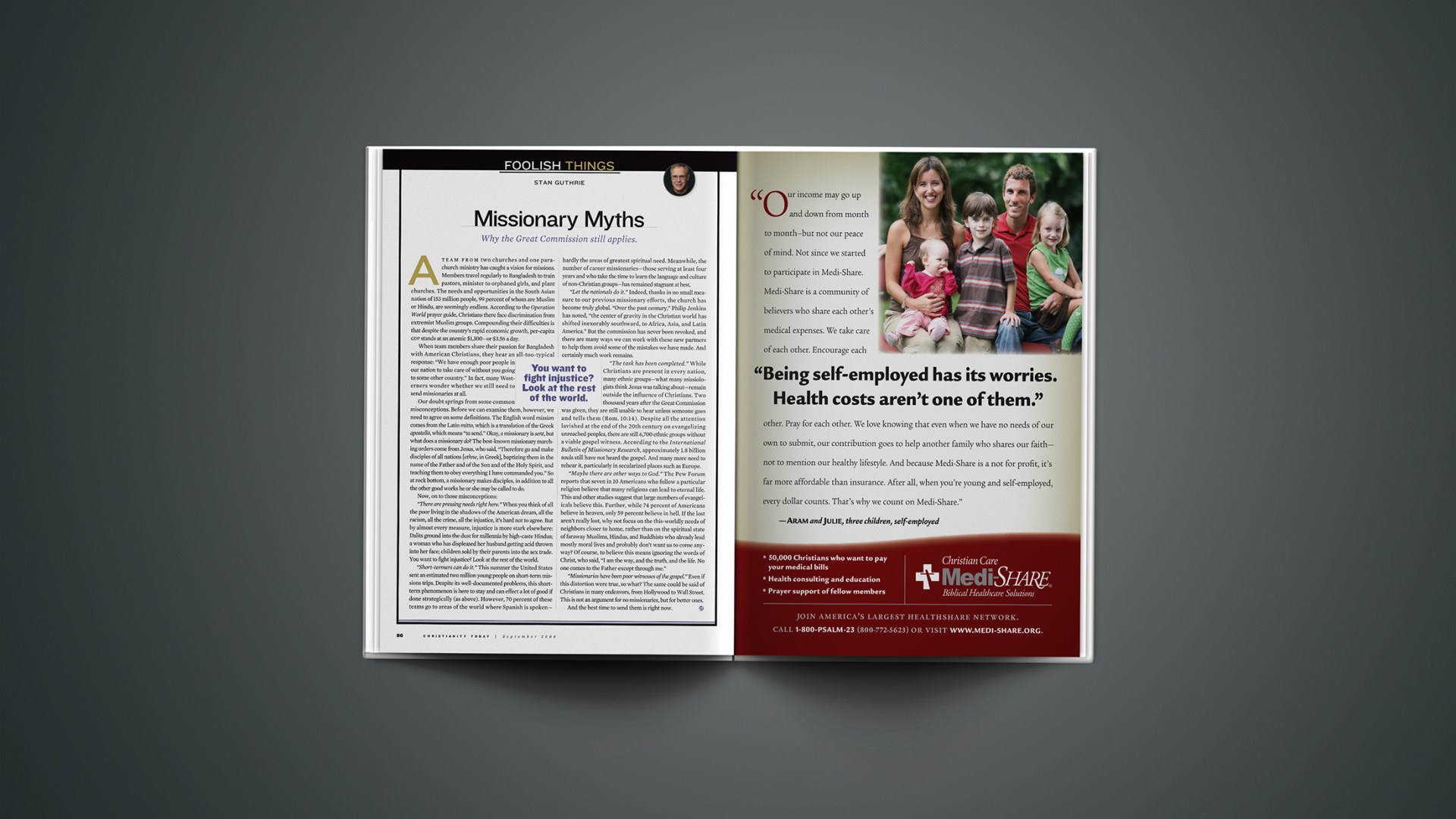A team from two churches and one parachurch ministry has caught a vision for missions. Members travel regularly to Bangladesh to train pastors, minister to orphaned girls, and plant churches. The needs and opportunities in the South Asian nation of 153 million people, 99 percent of whom are Muslim or Hindu, are seemingly endless. According to the Operation World prayer guide, Christians there face discrimination from extremist Muslim groups. Compounding their difficulties is that despite the country’s rapid economic growth, per-capita GDP stands at an anemic $1,300—or $3.56 a day.
When team members share their passion for Bangladesh with American Christians, they hear an all-too-typical response: “We have enough poor people in our nation to take care of without you going to some other country.” In fact, many Westerners wonder whether we still need to send missionaries at all.
Our doubt springs from some common misconceptions. Before we can examine them, however, we need to agree on some definitions. The English word mission comes from the Latin mitto, which is a translation of the Greek apostello, which means “to send.” Okay, a missionary is sent, but what does a missionary do? The best-known missionary marching orders come from Jesus, who said, “Therefore go and make disciples of all nations [ethne, in Greek], baptizing them in the name of the Father and of the Son and of the Holy Spirit, and teaching them to obey everything I have commanded you.” So at rock bottom, a missionary makes disciples, in addition to all the other good works he or she may be called to do.
Now, on to those misconceptions:
“There are pressing needs right here.” When you think of all the poor living in the shadows of the American dream, all the racism, all the crime, all the injustice, it’s hard not to agree. But by almost every measure, injustice is more stark elsewhere: Dalits ground into the dust for millennia by high-caste Hindus; a woman who has displeased her husband getting acid thrown into her face; children sold by their parents into the sex trade. You want to fight injustice? Look at the rest of the world.
“Short-termers can do it.” This summer the United States sent an estimated two million young people on short-term missions trips. Despite its well-documented problems, this short-term phenomenon is here to stay and can effect a lot of good if done strategically (as above). However, 70 percent of these teams go to areas of the world where Spanish is spoken—hardly the areas of greatest spiritual need. Meanwhile, the number of career missionaries—those serving at least four years and who take the time to learn the language and culture of non-Christian groups—has remained stagnant at best.
“Let the nationals do it.” Indeed, thanks in no small measure to our previous missionary efforts, the church has become truly global. “Over the past century,” Philip Jenkins has noted, “the center of gravity in the Christian world has shifted inexorably southward, to Africa, Asia, and Latin America.” But the commission has never been revoked, and there are many ways we can work with these new partners to help them avoid some of the mistakes we have made. And certainly much work remains.
“The task has been completed.” While Christians are present in every nation, many ethnic groups—what many missiologists think Jesus was talking about—remain outside the influence of Christians. Two thousand years after the Great Commission was given, they are still unable to hear unless someone goes and tells them (Rom. 10:14). Despite all the attention lavished at the end of the 20th century on evangelizing unreached peoples, there are still 6,700 ethnic groups without a viable gospel witness. According to the International Bulletin of Missionary Research, approximately 1.8 billion souls still have not heard the gospel. And many more need to rehear it, particularly in secularized places such as Europe.
“Maybe there are other ways to God.” The Pew Forum reports that seven in 10 Americans who follow a particular religion believe that many religions can lead to eternal life. This and other studies suggest that large numbers of evangelicals believe this. Further, while 74 percent of Americans believe in heaven, only 59 percent believe in hell. If the lost aren’t really lost, why not focus on the this-worldly needs of neighbors closer to home, rather than on the spiritual state of faraway Muslims, Hindus, and Buddhists who already lead mostly moral lives and probably don’t want us to come anyway? Of course, to believe this means ignoring the words of Christ, who said, “I am the way, and the truth, and the life. No one comes to the Father except through me.”
“Missionaries have been poor witnesses of the gospel.” Even if this distortion were true, so what? The same could be said of Christians in many endeavors, from Hollywood to Wall Street. This is not an argument for no missionaries, but for better ones.
And the best time to send them is right now.
Copyright © 2008 Christianity Today. Click for reprint information.
Related Elsewhere:
Previous columns by Stan Guthrie are available on our site.
Previous articles on missions and ministry are available on our site.










